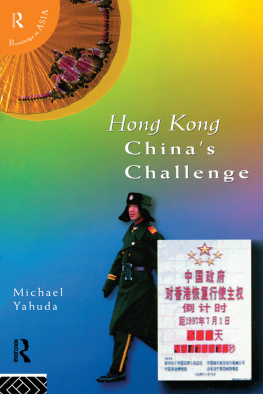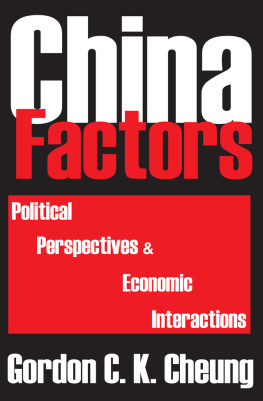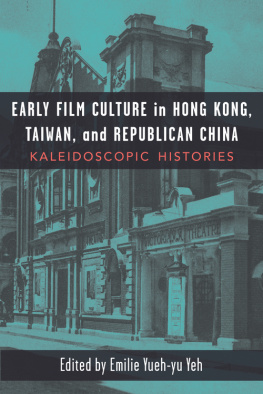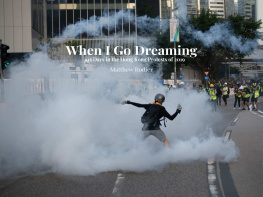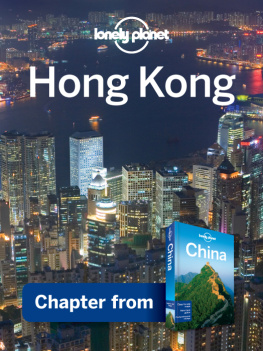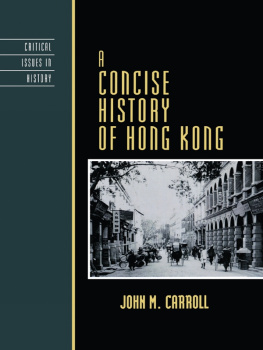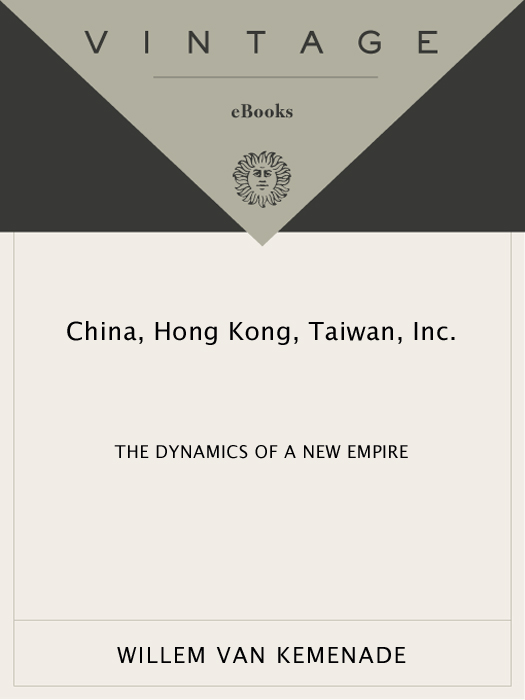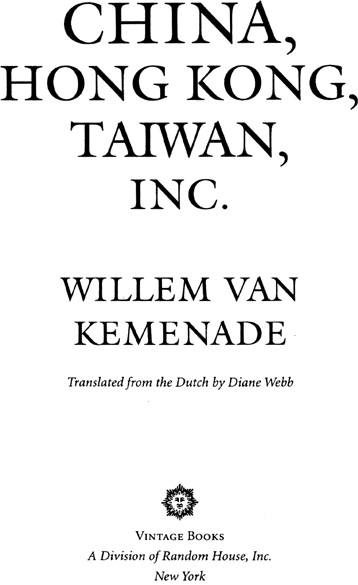Preface
Some people with ulterior motives have been spreading the idea that China poses a threat to the world, while it has to export 25 million pairs of shoes to buy one Airbus.
P EOPLES D AILY ,
December 1995
China, Hong Kong, Taiwan, Inc. is an updated and expanded version of its Dutch precursor, published in Amsterdam in early 1996. It contains substantial new sections on the major external events of 1996, such as the crisis in the Taiwan Strait, Beijings rapidly advancing preparations for the imminent takeover of Hong Kong, and the unexpected dtente in U.S.-China relations resulting from the Clinton administrations shift in China policy from inconsistent zigzagging to comprehensive engagement.
Important domestic developments, such as the further slowdown in state enterprise reform, and the resurgence of Marxist ideology, socialist spiritual civilization, and nationalism, have also been addressed. Less attention has been paid to the succession to the late paramount leader, Deng Xiaoping, and the consequences of his recent death at the age of ninety-two. The current formal party and state hierarchies have been in power since 1989, more or less guided, at least in the years immediately following the Tiananmen crackdown, by the invisible hand of Deng Xiaoping. After his last public appearance in 1994, however, Dengs influence receded into mere symbolism. President and party leader Jiang Zemin has assumed Dengs ill-fitting mantle of power, and the important issue now is who will replace Li Peng, whose second constitutional term as premier of the State Council will end in March 1998.
This book portrays and analyzes Chinas search for a new system, dealing with its transformation from a revolutionary Communist state obsessed with ideology and political struggle to a more conventional developing country, one that is trying to balance the key objectives of economic reform, social stability, and rapid growth. The Chinese peopleone-fifth of all mankindhave undeniably made great strides toward eliminating poverty and backwardness and modernizing their economy. The implementation of measures designed to bring about this transition, however, has caused many contradictions to surface, leading to temporary reversals and undesirable phenomena, particularly all-pervasive corruption.
Since the early 1980s, extensive trade with and investment from Hong Kongand, since the late 1980s, also Taiwanas well as the contaminating influence of the social systems and lifestyles of these two peripheral Chinese territories, have played a major role in this transformation. In just twenty years, the Chinese people have evolved from Mao-worshiping blue ants to nihilistic, ultra-individualistic, money-worshiping hedonists, perhaps the newest breed of economic animals, as the Japanese were labeled at the peak of their industrial rise in the 1970s.
The relocation to the Chinese mainland of Hong Kongs and Taiwans labor-intensive manufacturing bases, including their management skills and export know-how, has had a synergistic effect on the inexhaustible pool of cheap labor and emerging entrepreneurial talent in those areas. This has enabled the Peoples Republic, in less than a decade, to relinquish its impoverished autarky and join the league of major trading powers.
China is now well on its way to becoming the latest East Asian miracle, as exemplified by Japan and the four tigers (South Korea, Taiwan, Hong Kong, and Singapore). One day, perhaps, it will assume the role of mother of all tigers.
On 1 July 1997 China will resume sovereignty over Hong Kong on the basis of the one country-two systems formula. Although in economic and financial terms the merger can hardly fail, it is nevertheless beset with political pitfalls. During their final years of colonial rule, the British felt compelled to introduce formal democratic structures that would bolster the rule of law in Hong Kong after the Communist takeover in 1997. China wanted to maintain the status quo and keep Hong Kong a plutocracy ruled primarily by bureaucrats, bankers, and businessmen and only marginally by elected politicians. Beijing successfully mobilized the big-business community to oppose both the British and the Hong Kong Chinese democratic forces. Chinese leaders have stressed repeatedly that Hong Kong should be an economic city, a subsidiary of China, Inc., and not a political city from which democracy might spread to the mainland.
The question of reunification with Taiwan is far more complex. Taiwan is a rival, alternative Chinese (sub)nation with a fully elected political system and a strong independence movement. Moreover, unlike the expiring ninety-nine-year lease of Hong Kong, there is no deadline for the return of Taiwan, and the island enjoys the (conditional) support of the United States in opposing Chinese coercion. Nonetheless, with the impending takeover of Hong Kong, the resolution of the Taiwan question is moving to the top of Chinas national agenda.
As in Hong Kong, Beijing has managed to sow discord between the government of Taiwan and the countrys capitalists. Chinas strategy is to lure the Taiwanese business community into making ever-larger investments, at the same time undermining what remains of Taiwans international position with a policy of pressure and isolation. This policy has its ups and downs but is likely to become increasingly effective. Chinas threat of military force, aimed at intimidating the independence movement and influencing Taiwans presidential elections in March 1996, backfired after the United States sent a naval task force to shield Taiwan from possible invasion from the mainland. Political reunification between China and Taiwan remains a long shot, but economically Taiwan is already part of China, Inc., with approximately $20 billion in investment and $18 billion in indirect trade through Hong Kong, according to 1995 figures.
After the Hong Kong takeover, Chinas leverage over Taiwan will increase substantially and Taipei may soon have to make major concessions to Beijing and agree to establish direct trade, shipping, and air links.
Following in the footsteps of Japan, Inc. and the four tigers, China has become a predominantly economic state and is perhaps on its way to becoming a corporatist state, in which state conglomerates run by central government bureaucrats will be the pillars of society. China, Inc. is also highly mercantilistic, building up its industries behind high protective trade barriers. Government officials and businessmen connive in stealing foreign intellectual property and pirating foreign trademarks. At the same time, China is piling up trade surpluses that may soon exceed those of Japan.


